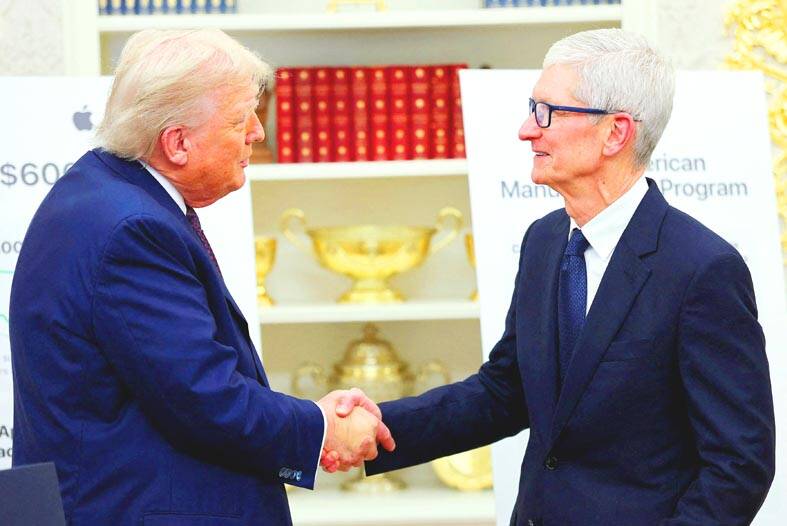Apple Inc would invest an additional US$100 billion in the US, taking its total pledge to US$600 billion over the next four years, US President Donald Trump said on Wednesday.
Trump announced the increased commitment at the White House alongside the tech giant’s CEO Tim Cook, calling it “the largest investment Apple has made in America.”
“Apple will massively increase spending on its domestic supply chain,” Trump added, highlighting a new production facility for the glass used to make iPhone screens in Kentucky.

Photo: Reuters
In February, Apple said it would spend more than US$500 billion in the US and hire 20,000 people, with Trump quickly taking credit for the decision. It builds on plans announced in 2021, when the company said it would invest US$430 billion in the country and add 20,000 jobs over the next five years.
“This year alone, American manufacturers are on track to make 19 billion chips for Apple in 24 factories across 12 different states,” Cook said in the Oval Office.
Trump, who has pushed US companies to shift manufacturing home by slapping tariffs on trading partners, claimed that his administration was to thank for the investment.
“This is a significant step toward the ultimate goal of ... ensuring that iPhones sold in the United States of America also are made in America,” Trump said.
Cook later clarified that, while many iPhone components would be manufactured in the US, the complete assembly of iPhones would still be conducted overseas.
“If you look at the bulk of it, we’re doing a lot of the semiconductors here, we’re doing the glass here, we’re doing the Face ID module here ... and we’re doing these for products sold elsewhere in the world,” Cook said.
Trump plans to impose a “100 percent” tariff on imported semiconductors, a major export of Taiwan, South Korea, China and Japan.
“We’re going to be putting a very large tariff on chips and semiconductors,” he told reporters at the White House on Wednesday.
Taiwan Semiconductor Manufacturing Co (TSMC, 台積電) — the world’s largest contract maker of chips, which counts Nvidia Corp and Apple among its clients — would be “exempt” from those tariffs as it has factories in the US, Taipei said yesterday.
While Trump did not offer a timetable for enactment of the new tech levies, on Tuesday he said fresh tariffs on imported pharmaceuticals and semiconductors and chips could be unveiled within the coming week.
The US is “going to be very rich and it’s companies like Apple, they’re coming home,” Trump said.
Trump further said that “Apple will help develop and manufacture semiconductors and semiconductor equipment in Texas, Utah, Arizona and New York.”
If tech companies commit to manufacturing their wares in the US, “there will be no charge,” he added.

IN THE AIR: While most companies said they were committed to North American operations, some added that production and costs would depend on the outcome of a US trade probe Leading local contract electronics makers Wistron Corp (緯創), Quanta Computer Inc (廣達), Inventec Corp (英業達) and Compal Electronics Inc (仁寶) are to maintain their North American expansion plans, despite Washington’s 20 percent tariff on Taiwanese goods. Wistron said it has long maintained a presence in the US, while distributing production across Taiwan, North America, Southeast Asia and Europe. The company is in talks with customers to align capacity with their site preferences, a company official told the Taipei Times by telephone on Friday. The company is still in talks with clients over who would bear the tariff costs, with the outcome pending further

NEGOTIATIONS: Semiconductors play an outsized role in Taiwan’s industrial and economic development and are a major driver of the Taiwan-US trade imbalance With US President Donald Trump threatening to impose tariffs on semiconductors, Taiwan is expected to face a significant challenge, as information and communications technology (ICT) products account for more than 70 percent of its exports to the US, Chung-Hua Institution for Economic Research (CIER, 中華經濟研究院) president Lien Hsien-ming (連賢明) said on Friday. Compared with other countries, semiconductors play a disproportionately large role in Taiwan’s industrial and economic development, Lien said. As the sixth-largest contributor to the US trade deficit, Taiwan recorded a US$73.9 billion trade surplus with the US last year — up from US$47.8 billion in 2023 — driven by strong

A proposed 100 percent tariff on chip imports announced by US President Donald Trump could shift more of Taiwan’s semiconductor production overseas, a Taiwan Institute of Economic Research (TIER) researcher said yesterday. Trump’s tariff policy will accelerate the global semiconductor industry’s pace to establish roots in the US, leading to higher supply chain costs and ultimately raising prices of consumer electronics and creating uncertainty for future market demand, Arisa Liu (劉佩真) at the institute’s Taiwan Industry Economics Database said in a telephone interview. Trump’s move signals his intention to "restore the glory of the US semiconductor industry," Liu noted, saying that

AI: Softbank’s stake increases in Nvidia and TSMC reflect Masayoshi Son’s effort to gain a foothold in key nodes of the AI value chain, from chip design to data infrastructure Softbank Group Corp is building up stakes in Nvidia Corp and Taiwan Semiconductor Manufacturing Co (TSMC, 台積電), the latest reflection of founder Masayoshi Son’s focus on the tools and hardware underpinning artificial intelligence (AI). The Japanese technology investor raised its stake in Nvidia to about US$3 billion by the end of March, up from US$1 billion in the prior quarter, regulatory filings showed. It bought about US$330 million worth of TSMC shares and US$170 million in Oracle Corp, they showed. Softbank’s signature Vision Fund has also monetized almost US$2 billion of public and private assets in the first half of this year,